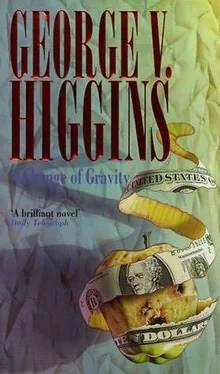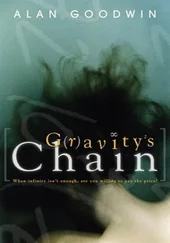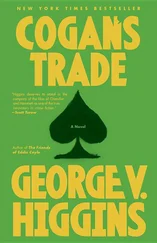George Higgins - A change of gravity
Здесь есть возможность читать онлайн «George Higgins - A change of gravity» весь текст электронной книги совершенно бесплатно (целиком полную версию без сокращений). В некоторых случаях можно слушать аудио, скачать через торрент в формате fb2 и присутствует краткое содержание. Жанр: Криминальный детектив, на английском языке. Описание произведения, (предисловие) а так же отзывы посетителей доступны на портале библиотеки ЛибКат.
- Название:A change of gravity
- Автор:
- Жанр:
- Год:неизвестен
- ISBN:нет данных
- Рейтинг книги:5 / 5. Голосов: 1
-
Избранное:Добавить в избранное
- Отзывы:
-
Ваша оценка:
- 100
- 1
- 2
- 3
- 4
- 5
A change of gravity: краткое содержание, описание и аннотация
Предлагаем к чтению аннотацию, описание, краткое содержание или предисловие (зависит от того, что написал сам автор книги «A change of gravity»). Если вы не нашли необходимую информацию о книге — напишите в комментариях, мы постараемся отыскать её.
A change of gravity — читать онлайн бесплатно полную книгу (весь текст) целиком
Ниже представлен текст книги, разбитый по страницам. Система сохранения места последней прочитанной страницы, позволяет с удобством читать онлайн бесплатно книгу «A change of gravity», без необходимости каждый раз заново искать на чём Вы остановились. Поставьте закладку, и сможете в любой момент перейти на страницу, на которой закончили чтение.
Интервал:
Закладка:
On July 18th, 1968, the day of Philip Fox's funeral in the Episcopal Church of St. John in Hampton Pond, government offices and small businesses there and in Hampton Falls, Canterbury, Cumberland and neighboring sections of Holyoke, Chicopee, Northampton and Springfield displayed hand-lettered signs in their windows and on their doors:
"Closed 11-1, in Memory of Phil Fox." Or just: "Philip Fox. 1882–1968." A columnist for the Springfield Union wrote: "Phil Fox died having spent a lifetime demonstrating, not declaiming, to all who knew him his unshakable belief that faith without good works is useless."
Even Fred Dillinger eulogized him. In his Transcript column he described Fox as 'the man who singled himself out if he was not first recruited, as he usually was to lead the area when it was time to solicit donations. It didn't seem to matter to him what the cause was.
To renew hope for a family burned-out of its home or a shop owner out of his business; to rally support for a fund-raising drive to send the Canterbury All Stars to Williamsport, Pa." for the Little League World Series; the Hampton Pond High School band to Washington for the Cherry Blossom Festival, or to New York for the St. Paddy's Day Parade. And when someone said to him, "Phil, you're not a Catholic, and you're not Irish, either," he said, "You're mistaken, my friend. On Saint Patrick's Day I'm Irish everybody is." He acted on his own each year to see to it that every hard-luck family had a turkey on Thanksgiving and Christmas, and a ham for Easter, too. Phil Fox may not have been a saint in Heaven's eyes, but to those of us on earth, he looked a lot like one. Phil Fox will be missed."
That column ran the day before the funeral. Reporting 'the enormous turnout to bid good-bye to Phil," the Transcript story said: "He did not confine his good works to his home town of Hampton Pond. He considered himself a local resident of every community where the Fox Agency did business. Whenever Canterbury or 'the Falls' or Cumberland had a question whether there'd be cash enough to help the poor or the unfortunate, or achieve a common civic goal, Canterbury and the other towns always knew they really had no question Canterbury had Phil Fox.
His grandson, Walter, will have giant shoes to fill, and as we express our sympathy, all of us will wish him well."
Walter was the successor because his father, Andy, had been among Marines killed at the Chosin Reservoir during the Korean Conflict.
Phil's other son, Walter's Uncle Cameron, was an episcopal priest, vicar of a well-to-do parish in Litchfield, Connecticut; he had never had any interest in the family business, 'anything involving actual work," Phil sometimes mildly said.
The consensus of the business community at the time of Phil's death was that Walter was a mere untested kid, too callow to take on the enterprise. His alternative was to sell the agency; there were aggressive bidders. He was aware of the consensus and it made him timid, but the operation of the agency was the only work he knew. At twenty-nine he felt too old to start a new career. Since he was the sole heir, it was his call to make. Nagged and hindered by his fear that the elders were right and he would make a disastrous mistake, he decided nonetheless to proceed.
The agency had rewarded his cautious management, perking along nicely and continuing to return decent profits, growing at a steady rate of two to three percent a year, just about keeping pace with inflation or staying a bit ahead of it. At first that gave him quiet satisfaction.
Then after a few more years he became somewhat more assertive. He began to think his instincts might in fact be fairly good, well worth relying on.
His first wife, Jacqueline, was the first to discover he had changed.
Having become 'terminally bored' in Canterbury, she had decided to unload her life with him there for a more stimulating career in TV production at station WTIC in Hartford. She was perfectly astonished when he hired Sam Evans to counter her libel for divorce with a vigorous one of his own. First he alleged desertion, claiming that her twelve-hour daily absence commuting to a ten-hour workday at Independence Plaza constructively amounted to desertion of his bed and board. Then he flabbergasted her by seeking custody of their child, and undisputed ownership and occupation of the marital domicile in Hampton Pond alleging she had proved herself an unfit mother by constructively leaving him to raise their daughter by himself.
Then he really stunned her: he won, on both prayers for relief (Jacqueline had made the right career choice for herself, though; in the three years she spent in Hartford, she displayed an affinity for her new work that made her professional catnip to the people building CNN in Atlanta; lured to Peach tree Plaza, she vanished into Georgia, never to be seen again north of Washington, D.C.).
Apparently emboldened by results, Walter as Merrion saw it began to act 'like a guy who's discovered that he doesn't really have to give a shit." He developed the confidence to admit freely he'd not only started out but remained 'wishy-washy, scared to death of making some dumb-ass greenhorn mistake that'll wreck the business' and that 'about the biggest change' he'd 'ever dared to make was adding on the logo," the red brush-stroke profile of a fox that now adorned the agency's For Sale signs and stationery While he freely confessed his opinion that its modest improvement in prosperity under his direction probably had more to do with regional population increases and his grandfather's reputation than with anything he had done, he began to think and soon after that to say that still he must deserve at least some credit for having been smart enough to leave a good thing alone.
One night at the house on Pynchon Hill, after everyone else had gone home and Diane was in the pantry cleaning up, he had poured 'one last nightcap' of Old Smuggler for himself and a Jack Daniel's for Mernon — "Meaning this'll make the third, for each of you," Diane said, from the kitchen and said that 'of course the thing that no one ever seems to notice, when they talk about your business and how it doesn't seem to've gotten much bigger, sort of sneering at you, is at least that little business that you got is still there, still chugging along, going strong, just like it always has been.
"It may've been a little engine, when you took control of it, and that may still be all it is, but when you got your grubby little paws on it, back then, it was the little engine that could, and by Jesus it still can. A lot of others like it, owners had the big ambitious plans: well, where're they today? Not around any more where could they've all gone? Gone belly-up, is where, not in business anymore. I think survival counts for something. I'll take it any day."
When Walter died, at the age of forty-two, Diane knew there was more to his estate than the house and the insurance agency, but she wasn't sure what it was or how much it was worth. He had told her something about a twenty-percent interest in some sort of a real estate and stock investment partnership, not itemized but left to her under the residuary clause of his will, along with the house on Pynchon Hill and two-thirds of the value of the Fox Agency. She had realized her understanding was imperfect, but left it that way because she hadn't wanted to seem to be too interested in what her prospects were if her robust husband died young. It seemed so very unlikely. Therefore about all she knew about the trust was that some time ago his grandfather had somehow acquired an interest in an investment consortium that continued to yield steady income, and that Merrion was in it too.
Once or twice when she had rebuked Walter for regularly having more to drink than was good for him, whenever Merrion was among the people they'd had over for the evening, he had tried to excuse it by telling her that he and Merrion were 'more'n just ordinary business associates.
Читать дальшеИнтервал:
Закладка:
Похожие книги на «A change of gravity»
Представляем Вашему вниманию похожие книги на «A change of gravity» списком для выбора. Мы отобрали схожую по названию и смыслу литературу в надежде предоставить читателям больше вариантов отыскать новые, интересные, ещё непрочитанные произведения.
Обсуждение, отзывы о книге «A change of gravity» и просто собственные мнения читателей. Оставьте ваши комментарии, напишите, что Вы думаете о произведении, его смысле или главных героях. Укажите что конкретно понравилось, а что нет, и почему Вы так считаете.











